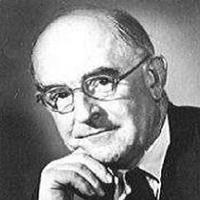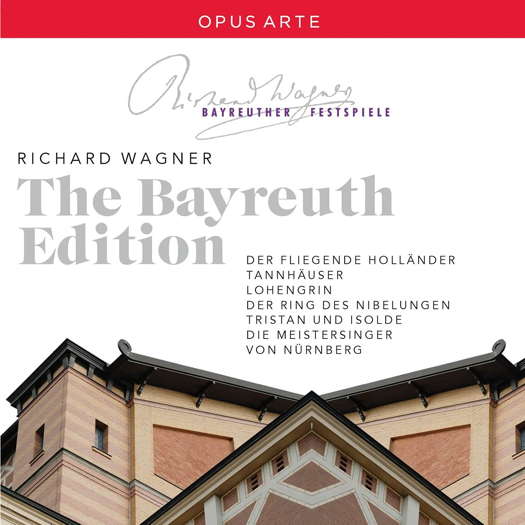- Argentinean
- Bo Nilsson
- Ketil Hvoslef
- Jan Pieterszoon Sweelinck
- Mary Plazas
- spoken voices
- Volodymyr Zelenskyy
- Schumann: Toccata Op 7
 SPONSORED: Ensemble. Unjustly Neglected - In this specially extended feature, Armstrong Gibbs' re-discovered 'Passion according to St Luke' impresses Roderic Dunnett.
SPONSORED: Ensemble. Unjustly Neglected - In this specially extended feature, Armstrong Gibbs' re-discovered 'Passion according to St Luke' impresses Roderic Dunnett.
All sponsored features >>
 DISCUSSION: John Dante Prevedini leads a discussion about Music and the Visual World, including contributions from Celia Craig, Halida Dinova and Yekaterina Lebedeva.
DISCUSSION: John Dante Prevedini leads a discussion about Music and the Visual World, including contributions from Celia Craig, Halida Dinova and Yekaterina Lebedeva.

Wagner in Bayreuth Today
GIUSEPPE PENNISI explores a box set from Opus Arte
'... an excellent set of CDs to hear where Bayreuth is up to today.'
The British label Opus Arte has just issued an elegant box set - thirty CDs or about thirty-five hours of listening - of great interest to Wagnerians and beyond. Entitled Richard Wagner: The Bayreuth Edition, it collects recordings of Der Fliegende Holländer, Tannhäuser, Lohengrin, Der Ring des Nibelungen - obviously all the four operas, Tristan und Isolde and Die Meistersinger von Nürnberg. In fact, only Parsifal is missing, as well as the three early works that Wagner almost repudiated and by his choice were never performed in Bayreuth, not even posthumously.
The box set is rich in music but spartan in editorial attire. The accompanying booklet contains only the cast and year of production, without essays, biographies of the performers or photographs of the staging. In many respects, it is an understandable choice. On the one hand, the 35 hours of listening are addressed to Wagner enthusiasts who have, in their collections, studio recordings of the same works; for example, I have ten recording of Der Ring. On the other hand, the recordings were made from 2008 to 2014, years in which directors and sets were much discussed by both critics and the public: photos would not have added much to the value of the box.
The important feature is that these are 'live' recordings, as rarely done nowadays, especially for Wagner operas. Except for Der Ring, where the period is indicated (July-August 2008) and for Die Meistersinger von Nürnberg (the 2008 Festival), the precise day of the recorded performance is indicated for the other works. This means that no adjustments or fine tuning were made using multiple recordings. Instead of diminishing the value of the box, this makes it more valuable. Those who listen to it probably have, on their shelves, several studio editions (from the famous Ring conducted by Georg Solti in the mid-sixties – a masterpiece of stereophony!). There is, therefore, something fascinating about listening to performances so 'alive' with applause as to almost feel involved: sitting on the uncomfortable benches of the Bayreuth Festspielhaus, built of wood, and sweating four shirts under the northern Bavarian sun. (The shows start at 4pm and there is a one hour interval between acts.).
A review of each of the nine performances would require an essay, much more space than is available here and probably much more patience than readers have. Therefore, I give a few hints of the aspects that seem to me to be particularly important.
I start backwards from Die Meistersinger von Nürnberg, not only because I consider it the most beautiful (and deepest) musical comedy of all time - Adorno said that alone it was worth as much as all of Shakespeare's plays - but because the live recording gives us a Franz Hawlata (in the leading role, Hans Sachs) in full shape. I had heard him a few years earlier, in the same part, in Berlin and he had enchanted me: especially in the Act III 'Wahn, Wahn' with perfect balance between sadness, first, and joy, then, of accepting that I was too old to marry Eva.
Unfortunately, only a couple of years after this recording, I listened to him at the Erl Festival in Tyrol: although still young, he had lost his enamel and was about to retire. On the recording, the singing of Klaus Florian Vogt in the role of Walter von Stolzing is beautiful.
The Eva of Michaela Kaune, a young soprano who, in Italy, I remember having heard only in Florence and Venice, is sweet.
Sebastian Weigle's conducting is good but not exceptional.
Of great depth, however, is the direction of Christian Thielemann of Der Ring des Nibelungen. The conducting takes all colors and shades and there is more a sense of fairytale than of parable.
Listen — Wagner: Prelude (Das Rheingold)
(CD1 track 1, 3:47-4:45) ℗ 2008 Bayerischer Rundfunk :
Listen — Wagner: Trauermarsch (Götterdämmerung Act III)
(CD4 track 11, 4:35-5:28) ℗ 2008 Bayerischer Rundfunk :
Thielemann remembers the late 1960s studio recording of the production directed by Karajan with the same interpreters with whom he had performed it in Salzburg. Especially on the 'second day' Siegfried, where only listening can you hear the forest and its murmur.
Listen — Wagner: Nun Sing! (Siegfried Act II)
(CD3 track 10, 0:00-0:40) ℗ 2008 Bayerischer Rundfunk :
From a vocal point of view, Albert Dohnen is a sumptuous Wotan.
Listen — Wagner: Loge, Hor! (Die Walkure Act III)
(CD4 track 16, 0:00-0:59) ℗ 2008 Bayerischer Rundfunk :
Linda Watson is an excellent Brunhilde. Stephen Gould is effective as Siegfried, despite being already a little ahead of his time.
The Ring requires thirty-five soloists. All of them are of a high level, but in this edition, the real magic is the orchestra.
In Tristan und Isolde, recorded on 9 August 2009, there is good conducting by Peter Schneider but the interesting aspect is the voices of the two protagonists, the American Robert Dean Smith and the Swedish Iréne Theorin. Neither of them are very young, but they face the long and very difficult duet of the second act very well, remembering that the recording is 'live'.
Listen — Wagner: Lausch, Geliebter! (Tristan und Isolde)
(CD2 track 12, 0:13-0:58) ℗ 2010 BF Medien GmbH :
In Der Fliegende Holländer, recorded on 25 July 2013, it is still the almost pictorial direction of Christian Thielemann that sets the tone. There is a good but not excellent cast, but all the emphasis is on the orchestra: from the impetuous initial storm to the final apotheosis.
Listen — Wagner: Lausch, Geliebter! (Der Fliegende Holländer)
(CD2 track 16, 1:11-2:11) ℗ 2010 BF Medien GmbH :
In Tannhäuser, Torsten Kerl is notable in the role of the protagonist. Notable too is Marcus Eiche singing Wolfram von Eschembach, while the Elisabeth of Camilla Nylund and the Venus of Michelle Breedt are good but not remarkable. The orchestra, conducted by Axel Kober, is good.
In Lohengrin, finally, the direction of Andris Nelsons accentuates the structure of a great romantic opera in which both Klaus Florian Vogt in the title role and Annette Dasch in that of Bramante's Elsa excel.
Listen — Wagner: Das Süße Lied Verhallt (Lohengrin Act III)
(CD3 track 3, 2:45-3:43) ℗ 2011 BF Medien GmbH :
In short, this is an excellent set of CDs to hear where Bayreuth is up to today.
Copyright © 19 November 2021
Giuseppe Pennisi,
Rome, Italy

CD INFORMATION: THE BAYREUTH EDITION


